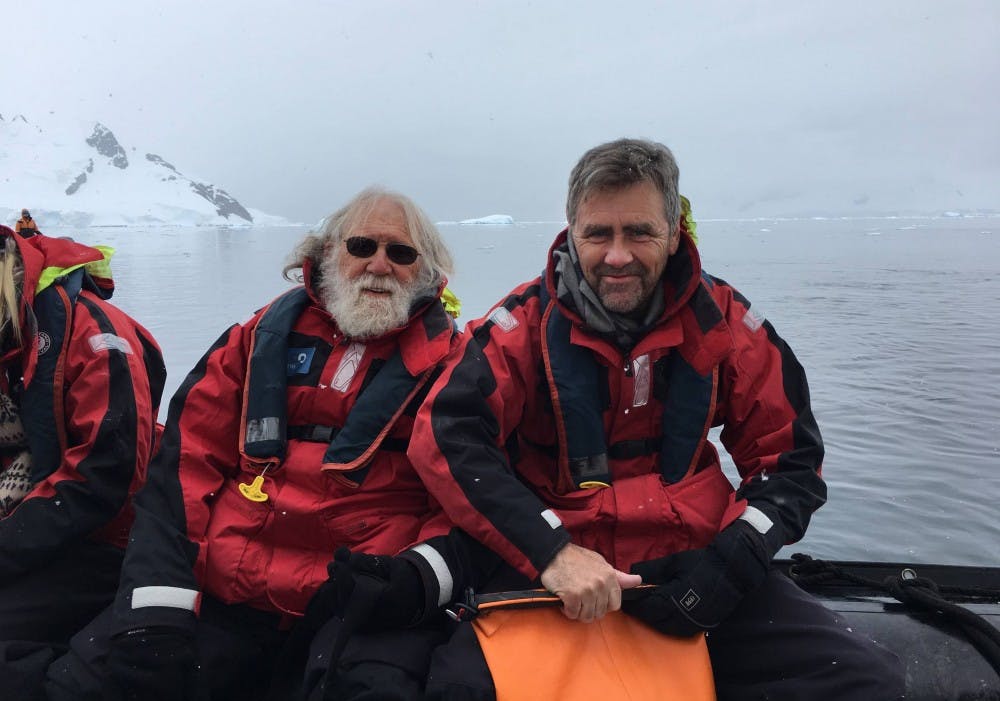Charles Gordon Gross, a professor emeritus of psychology at the Princeton Neuroscience Institute (PNI) and pioneer of cognitive neuroscience, died at age 83 in Oakland, Calif. on April 13.
Gross is best known for his discovery of neurons that fire in response to recognizing complex stimuli, such as hands and faces. His research formed the basis for modern cognitive and social neuroscience and showed that the brain has special machinery for handling specific demands.
Michael Graziano ’89 GS ’96, now a University professor of psychology, first fell in love with psychology while taking one of Gross’ classes as an undergraduate and went on to complete his senior thesis in Gross’ lab. He also returned to the University to complete his doctorate and post-doctorate work.
“He was a brilliant mentor,” Graziano said of Gross. “The most successful neuroscience mentor of the 20th century.”
Graziano said that part of Gross’ success came from his openness to new ideas. He said Gross was deeply invested in all of the work in his lab, which spanned multiple fields and projects. When Graziano became a faculty member, he continued collaborating with Gross, whose office was right next door to his own.
“He didn’t do agenda-driven science,” Graziano said. “He let people think out their own ideas and pursue their own interests. He encouraged people to find their own scientific legs.”
Prior to Gross’ contributions, scientists believed that individual neurons are triggered by and fire in response to simple shapes and lines. They believed an ensemble of these neurons then work together to encode an intricate visual stimulus – in the case of a face, for instance, one neuron might respond to eyes, another to a nose, and so on.
Gross’ research revealed that individual neurons in the inferior temporal cortex can respond selectively to complex stimuli like hands and faces, rather than simple spots, slits, or edges. Furthermore, specific neurons can only be triggered when presented with entire faces, not just fragments of them.

These ideas were highly unconventional when Gross first presented them. It would be more than ten years before researchers began attempting to replicate his results, which are now some of the most well-established in the field.
Gross was born in Brooklyn, NY on Feb. 29, 1936. He graduated as a biology major from Harvard University in 1957, and in 1961, he received a Ph.D. in ethology from the University of Cambridge, which he attended on a Fulbright scholarship.
Gross began his pioneering work at the MIT in 1961, performing single-neuron experiments with monkeys. At first, he and his colleagues tried stimulating the primates’ visual systems with bars of light. After that approach failed, they tried using images of hands, and later faces, as stimuli. When the monkeys were shown these images, their brains responded strongly. The findings Gross made are applicable to a variety of sub-fields, including visual learning, memory, perception, and pattern recognition. Throughout his career, he authored more than 300 articles and several books, including “Brain, Vision, Memory: Tales in the History of Neuroscience” in 1999 and “A Hole in the Head: More Tales in the History of Neuroscience” in 2009.
“He had an encyclopedic knowledge of the history of neuroscience,” said Alexander Todorov, a professor of psychology at the University. In 2009, Gross married Joyce Carol Oates, the Roger S. Berlind ’52 Professor of Humanities, Emeritus, whom he met through mutual friends in the summer of 2008. Four years later, he transferred to emeritus status himself, although he continued to teach a neuroethics course until the fall of 2018.

In addition to being a dedicated scientist, Gross was a passionate traveler, making trips throughout his life to Antarctica, Brazil, Cuba, Mongolia, Uganda, and many other places. He was an accomplished photographer, displaying his photos at art exhibitions and in living rooms of friends and colleagues.
Asif Ghazanfar, another professor of psychology at PNI, frequently traveled with Gross.
“Charlie was an amazing traveler,” Ghazanfar said. “He wanted to understand things intimately,” rather than frequent typical tourist destinations.
“He knew the right way to travel,” Ghazanfar said. “It was always an adventure.”
Michael Littman, a professor of mechanical and aerospace engineering at the University, worked with Gross and Graziano while Graziano was a Ph.D. candidate. He remembers Gross for his careful planning and meticulous experiments.
“He was very serious and thorough,” Littman said. “No stone was left unturned” in designing experiments or analyzing results.
Although Gross was careful in communicating the implications of his work, he was sometimes misattributed for having proven the existence of so-called “grandmother cells,” which individually respond to a specific face. For example, one neuron might respond to your mother, another to your father, and another to your grandmother. Recently, this idea has been expanded to the concept of the “Jennifer Aniston neuron” – a neuron that fires only when a person sees a picture of Jennifer Aniston.
Gross did not support this theory. Rather, he advocated for a population-based model, in which a group of cells responds to faces in general. Under his theory, the cells then modulate their activity in response to specific faces.
Gross’ colleagues remember him for his unique approaches to problems and his congenial spirit. Todorov recalls that despite Gross’ incredible accomplishments, he always stayed down-to-earth and willing to listen and learn from others.
“He was a great role model and created very close relationships with colleagues, graduate students, and others,” Todorov said.
Littman agreed, recalling Gross’ “quick mind and great humor.”
“He had this very expansive, energetic, generous personality,” Graziano said. “He filled up the room with this incredible amount of vibrancy and cheerfulness.”








